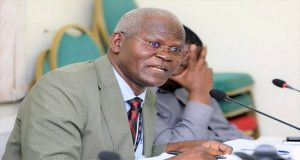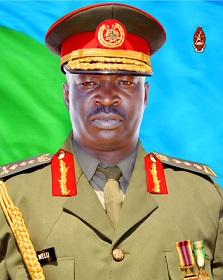
By Executive Editor
Drilling for Tilenga is expected to begin in April 2023, the Uganda National Oil Company – UNOC has said. 3 drilling rigs will be used, UNOC adds. The revelation is part of the oil company’s response in a virtual Q and A days ago.
The session concentrated mainly on Kasuruban PSA and license 2, updates on the refinery, JST takeover, launch of drilling at Kingfisher and Women in energy network.
Below is the Q and A:
Qn: Are there any changes to the pricing or availability of petroleum products at JST following the change in management?
Ans: UNOC’s strategy is to improve product stock holding at JST. This should enable the oil marketing companies to always get competitive product prices, which should translate into relatively fair retail pump prices in relation to movement of crude oil prices.
Qn: Many institutions in Uganda are teaching oil and gas but the truth is they don’t have capacity to handle practicals and also to procure expensive oil and gas software. As UNOC, how do plan to assist these institutions as part of corporate social responsibility?
Ans: UNOC has partnered with UPIK, one of the leading training institutions for oil and gas. They have the capacity to offer all-round training. They also offer certification for internationally accredited courses. UNOC has sponsored the skilling of 25 youths.
Qn: As the Oil and Gas sector has already kick started, what is the current percentage of local content included in projects such as the exploration, appraisal and development of existing blocks?
Ans: Contracts worth US$ 7B for the Tilenga, Kingfisher and EACOP Projects have been submitted to PAU for review. Commitments worth US$ 1.7B to Ugandan companies have been made, representing 25%.
Qn: What is the latest update in the search for prospective partners for the Mpigi storage terminal? When do you anticipate works to begin and conclude?
Ans: The engagement with the market to secure a Joint venture partner should commence by April 2023. The plan is to ensure that the facility is up and running by 2025.
Qn: I understand that the Kingfisher oil wells will be below L.Albert. Are there any challenges especially regarding Envt. Degredation that you have already discovered and mitigated?
Ans: This is onshore drilling. Any potential environmental challenges have been catered for under the environmental social impact assessments (ESIAs) of this project area.
Qn: When is drilling expected to begin for the Tilenga oil and gas project in Uganda, and how many drilling rigs will be used for this project?
Ans: Drilling for Tilenga is expected to begin in April 2023 and 3 drilling rigs will be used.
Qn: Uganda National Oil Company (UNOC) recently acquired a petroleum exploration license for Kasuruban, an oil and gas block in Western Uganda. What does this mean for the Uganda’s energy sector?
Ans: More Job opportunities for all Ugandans directly or through service provision.
And also reserves replacement assurance once discoveries are made in this Block.
Qn: Is UNOC a publicly listed company? And if so how can one buy shares in it?
Ans: No, we are a limited liability company incorporated under the Companies Act of 2012.
Qn: What are the strategies that UNOC have put in place for unknown circumstances that may cause fuel prices go high due to the low storage in the fuel tanks in the Jinja terminal?
Ans: The key strategies include ensuring that the facility is always well stocked with both UNOC’s trading products and those of oil marketing companies that are using the facility for interim storage.
Qn: Drilling of oil could raise concerns of noise pollution and environmental degradation especially land, what measures has UNOC put in place to ensure the environment remains untampered with in regards to the oil drilling activity?
Ans: UNOC & its joint venture partners considered environmental and human related potential impacts in the development of these projects. Related environmental licenses have been secured. There will, therefore, be very minimal effects to both environment and people.
Qn: When is the Graduate training program by UNOC kick starting?
Ans: The graduate trainee program is ongoing. Look out for the opportunities online (our platforms), website and newspapers.
Qn: How will the farmers in Uganda benefit from oil refinery?
Ans: Fertilisers will be some of the byproducts of the refinery, reducing reliance on imported fertilisers. Farmers will also have an opportunity to supply produce to service companies and personnel during the construction and operation phases. The airport also seated on the Kabaale Industrial Park in Hoima, will support export of farm produce.
Qn: There are two fiscal terms usually used in the oil and gas sector; contractual and concession. What informed Uganda’s decision to opt for contractual?
Ans: A lot was taken into consideration for the decision to be made with the priority being to protect Uganda’s interests. In the concessionary system, the contracts signed with the International oil company (IOC) are for long periods 60 years plus; the contract area is vast. Sometimes an entire country and the IOCs have control over the schedule and the way reserves are developed plus there’s no requirement from the IOC to produce hence in times of low oil prices they can reduce production without any penalties and the host government (HG) has no. rights aside from the right to receive payment based on production. While in the contractual system, the HG receives a lot of benefits e.g. IOCs bring expertise and experience; exploration risk is borne by the IOC; HG maintains.
Qn: Have you tried with Uganda Petroleum Institute Kigumba (UPIK)? It is a Public Tertiary Institution that came into existence following a directive from His Excellency the President of the Republic of Uganda in 2009.
Ans: Yes, we have. We have sponsored scholarships for students to acquire the International Vocational Qualification (IVQ) at UPIK. The students got scholarships meant to impart skills and subsequent employment in the oil and gas sub-sector.
Qn: How should the community organize to benefit from kasurubani block for the upcoming oil exploration in the area?
Ans: We are dedicated to supporting the community to ensure everyone is included and benefits from the Kasurban Exploration. We have a National Content Strategy that includes a pillar on Community Content to ensure the local community has the resources and support they need to thrive.
Qn: What is Jinja Storage Terminal (JST) and we have recently seen that you have taken fully charge of it, what do Ugandans expect from that storage?
Ans: JST is a 30 million-liter capacity fuel storage terminal. It is a national strategic reserve facility that will play a critical role in the energy supply chain by providing consumers with a secure and reliable fuel source. It will also help stabilize fuel prices.
Qn: How does UNOC work to ensure that women have equal opportunities for professional development and career advancement within the company, particularly in traditionally male-dominated fields?
Ans: At UNOC, we are committed to promoting #GenderEquality in the workplace. We strive to ensure that women have access to mentorship, networking, and professional development opportunities. We carry out regular assessments of progress in achieving gender parity.
Qn: Murchison Falls NP houses more than half of Africa’s birds, 40 percent of Africa’s mammals and about 20 percent of its amphibians and plants. The oil project has direct effects on this flora and fauna. What steps are you putting in place to prevent the worst?
Ans: Before commencement of the projects, potential impacts were considered during the environmental and social impact assessments. Mitigation measures were identified, documented and will be implemented. All this was subject to
NEMA approval and key guiding principles in protecting the environment and its components are avoiding and mitigating.
Qn: What comprehensive plan do you have for handling Tilenga drilling waste and oil field produced water to avoid endangering the environment?
Ans: In partnership with TotalEnergies and CNOOC Uganda Ltd, the Tilenga project abides by the approved ESIA by NEMA to handle waste management in a sustainable way. EnviroServ & Luwero industries are the contractors for TotalEnergies and &
CNOOC Uganda Ltd respectively.
Qn: What is the Kasuruban PSA and license and how does it relate to the oil and gas industry?
Ans: The Kasuruban Exploration License gives UNOC operatorship over the Block to undertake petroleum exploration activities. The PSA caters for Fiscal and Contractual Terms over the Block.
Qn: What interest does UNOC have in the Tilenga and Kingfisher Projects?
Ans: We hold a 15% interest. Uganda will also be entitled to royalties, taxes, etc. which will in total work out to approx. 70% benefit to Uganda per barrel.
Qn: We have seen various groups fighting construction of EACOP, as a Ugandan company concerned about its citizens, have you listened to their complaints about that pipeline and which measures have the stakeholders put in place ensure Ugandans safety?
Ans: UNOC together with TotalEnergiesUG and CNOOC Uganda Ltd are intentional about listening to all stakeholders affected and impacted by the O&G projects. UNOC has a robust stakeholder management plan the ensures that all complaints are heard. UNOC also has a grievance management procedure to manage all grievances. UNOC assures all Ugandans that the pipeline is safe, it is insulated and will be buried 2 meters in the ground. Implementation of the EACOP project is in line with the approved ESIA stands at 81% and 93% of PAPs have signed compensation agreements.
Qn: How has UNOC prepared the people living in Kasuruban block (Buliisa, Houma and Masidi district) for the upcoming oil exploration in the area?
Ans: The execution of the work program over the Kasuruban area has not yet started, however our Community Liaison staff will be engaging the communities regarding any planned activities and possible opportunities.
Qn: We well know that UNOC was licensed for Petroleum exploration of Kasuruban block, so does it mean that other operators like Total Energies’ UG and CNOOC UG won’t have Powers of other upstream stages over it??
Ans: Kasuruban is an independent upstream project. Total E&P and CNOOC won’t have powers. However UNOC will/may use the available common facilities operated by these Companies at such stages. Exploration license on 2nd February 2023. The Kasuruban Contract area is located in Northern Lake Albert sub basin in Buliisa district, south of the Tilenga Field Development Area. The block covers 1,285 square kilometers onshore and offshore of Lake Albert.
Qn: Tell us brief details about Kasuruban and its licence..
Ans: UNOC is mandated among other functions to investigate and propose new upstream, midstream, and downstream ventures initially locally and later internationally. In bid to implement this mandate, UNOC participated in the second licensing round announced by the in May 2019 UNOC submitted an application for petroleum exploration and production license for Kasuruban Block in September 2021. UNOC was invited negotiate the Production Sharing Agreement for the Block, which culminated into its signing and grant of a petroleum. exploration license on 2nd February 2023. The Kasuruban Contract area is located in Northern Lake Albert sub basin in Buliisa district, south of the Tilenga Field Development Area. The block covers 1,285 square kilometers onshore and offshore of Lake Albert.
Qn: What challenges and opportunities do you foresee for Uganda’s oil and gas industry in the long term, and how can they be addressed?
Ans: Uganda’s oil & gas industry has tremendous potential for growth in the long term. We have ensured that the right policies and infrastructure are in place to maximize opportunities and mitigate potential challenges.
Qn: Are there opportunities for supply tenders in this Oil network and What does it take one to know and compete for such opportunities?.
Ans: Ensure that you are registered on the National Supplier Database (NSD). To compete for such opportunities, interested parties should visit the operators’ websites to review the tender requirements and submit their bids per the instructions.
Qn: How will the production of liquified petroleum gas from the upstream and a refinery in Hoima help to address environmental challenges in Uganda, according to President Yoweri Museveni?
Ans: Currently, there’s 120,000 hectares of forest cover destroyed annually. 90% of our energy is derived from bio-mass or charcoal. With LPG production, more Ugandans will have access to cleaner energy, ending the destruction of forest cover.






